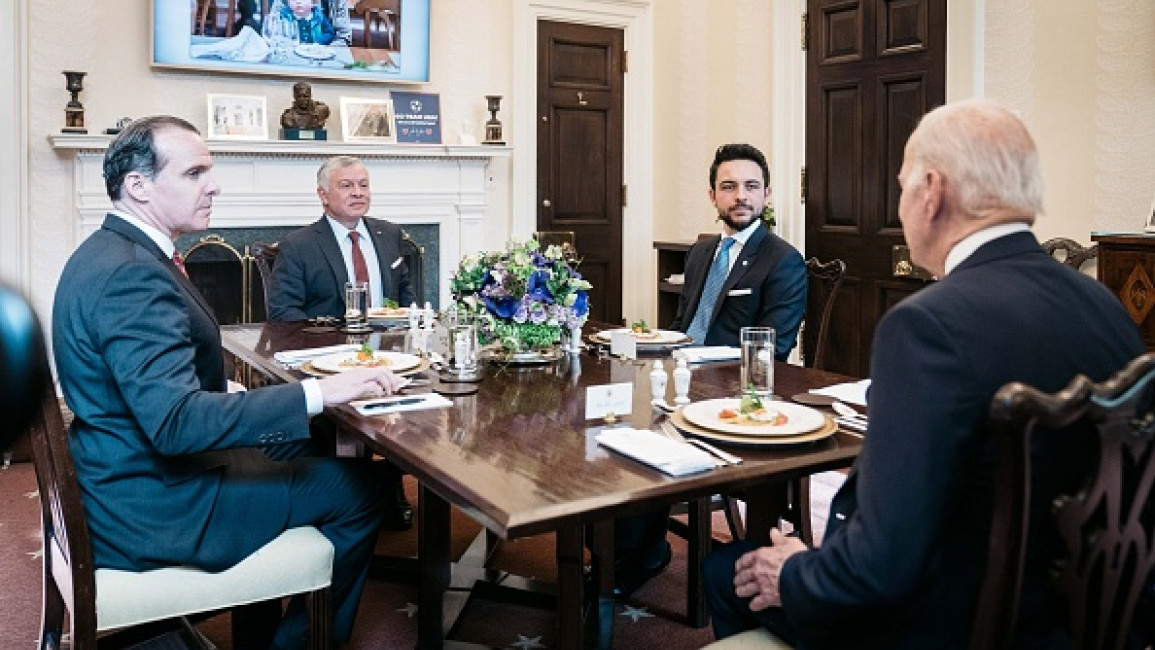Biden stresses need to 'preserve status quo' in Al-Aqsa in meeting with Jordan's King Abdullah
US President Joe Biden stressed the need to preserve the status quo at Al-Aqsa Mosque in Jerusalem during a meeting with Jordan's King Abdullah II on Thursday, as violence escalates in the occupied Palestinian territories.
Near daily Israeli raids in the occupied West Bank have left over 220 Palestinians dead since March 2022. A Palestinian man killed seven Israelis near a synagogue at a settlement in occupied East Jerusalem on 27 January.
Jordan's king has called for de-escalation in Palestine and met with Israeli PM Benjamin Netanyahu in Amman, where he urged the premier to respect the Hashemites' role as custodians of holy sites in Jerusalem.
Abdullah had previously said that he would not allow his "red lines" in Jerusalem to be crossed by Netanyahu's right-wing government during an interview with CNN in December.
During Thursday's meeting with Biden, the king "stressed the need to cease Israeli measures that undermine the two-state solution".
President Biden also "reaffirmed his support for the two-state solution" and noted "the vital role of the Hashemite Custodianship of holy sites in Jerusalem".
King Abdullah further emphasised the royal family's ties to the holy sites in Jerusalem at the National Prayer Breakfast in Washington, D.C., on Thursday.
"For more than a hundred years, we have been entrusted with the Hashemite Custodianship of the city's Muslim and Christian holy sites," King Abdullah said. He added that the Hashemites' lives have been "entwined with that of the city for generations".
Part of the Hashemites' popular legitimacy comes from its custodianship of the holy sites, with the royal family charged with maintaining the churches and mosques in the area.
Popular sentiment in Jordan is overwhelmingly in support of the Palestinians and opposes any form of normalisation with Israel.
The Jordanian government has sparked popular outrage in the past when it cooperated with Israel, such as when it signed the "energy for water" deal in November 2021.
The king has been adamant in his rhetoric about resisting Israeli encroachment on Palestine, famously presenting his “three no’s” when the Trump administration floated the so-called Deal of the Century.
Abdullah told Jordanians that he would say no to the resettlement of Palestinians, no to establishing Jordan as an alternative homeland to Palestinians, and no to giving up the custodianship of Jerusalem's holy sites.
In addition to seeking US assurances about Hashemite custodianship in Jerusalem, Thursday’s meeting touched on possible political solutions to the Israeli occupation of Palestine.
"It is expected that the king will emphasise the need to expand the scope of the current US administration's interests … to include creating a political horizon for the two-state solution," Ahmad Awad, the managing director of the Amman-based Phenix Center for Economic and Informatics Studies, told The New Arab.
"This contradicts the priorities of the US administration, which has been clear that it is not interested in at the present time entering a political track for this thorny issue."
On Thursday, media outlet Axios revealed that the US is pressuring the Palestinian Authority (PA) to adopt a new security plan in Jenin and Nablus, two spots of particular tension in the West Bank.
The plan would include PA forces being deployed around the two cities in order to tamp down activity from Hamas, Islamic Jihad, the Lions' Den, and other armed groups.
Reportedly, the PA has not accepted the plan and expressed "many reservations" about it".
The US-Jordanian relationship has been historically close and Jordan is the third largest recipient of US foreign aid.
In September 2022, Washington pledged over $10 Billion in foreign aid to Jordan over the next seven years – more than doubling what the US was giving the country a decade earlier.
The US relies heavily on Jordan for security and intelligence cooperation in the region, as well as to absorb refugee flows from neighbouring Iraq and Syria.



